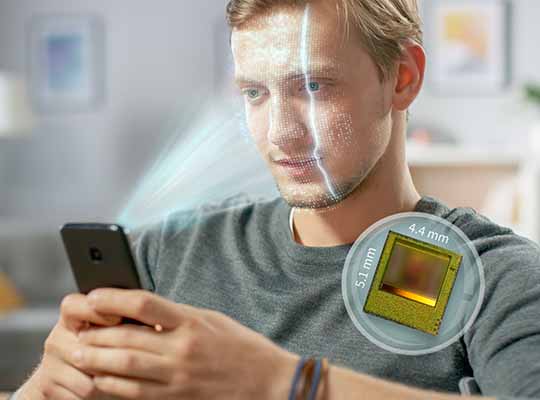Reliable face authentication, improved photo functions and authentic augmented reality experiences: 3D depth sensors assume a key role in smartphones and for applications that rely on accurate 3D image data. Infineon Technologies AG has collaborated with software and 3D Time of Flight system specialist pmdtechnologies ag to develop the world’s smallest and at the same time most powerful 3D image sensor, and is presenting it at CES in Las Vegas. The new REAL3 single-chip solution measures just 4.4 x 5.1 mm and is the fifth generation of successful time-of-flight deep sensors from Infineon. In addition to its small dimensions, which allow it to be incorporated into even the smallest devices with just a few elements, the chip provides the highest resolution data with low power consumption.
“With the fifth generation of our REAL3 chip we are once again demonstrating our leading position in the field of 3D sensors,” says Andreas Urschitz, President of the Power Management and Multimarket Division at Infineon, which also includes sensor business. “It’s robust, reliable, powerful, energy efficient and at the same time decisively small. We see great growth potential for 3D sensors, since the range of applications in the areas of security, image use and context-based interaction with the devices will steadily increase.” The 3D sensor also allows the device to be controlled via gestures, so that human-machine interaction is context-based and without touch.
Deep sensor technology from Infineon
The depth sensor time-of-flight technology enables an accurate 3D image of faces, hand details or objects which is relevant when it must be ensured that the image matches the original. This is already applied in payment transactions using mobile phones or devices that need no bank details, bank cards or cashiers and the payment is carried out instead via facial recognition. This requires an extremely reliable and secure image and return transmission of the high-resolution 3D image data. The same applies to securely unlocking devices with a 3D image. The Infineon 3D image sensor also implements this in particular in extreme lighting conditions such as strong sunlight or in the dark.
Furthermore, the chip provides additional options for ambitious photos with cameras, for example, with enhanced autofocus, bokeh effect for photo and video, and improved resolution in poor lighting conditions. Real-time full-3D mapping also allows authentic augmented reality experiences to be presented.
Development and availability
The new 3D image sensor chip (IRS2887C) was developed in Graz, Dresden and Siegen and combines the expertise of Infineon’s and pmdtechnologies’ German and Austrian locations. Series production will begin in the middle of 2020. In addition, Infineon Technologies offers an optimized illumination driver (IRS9100C) that further improves performance, size and cost as a complete solution.
More information please visit at www.infineon.com/real3.













